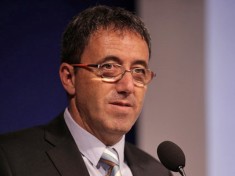-
Gidon Bromberg on Water and Environmental Peacebuilding
February 1, 2019 By Evan Barnard “The Jordan River has been the lifeblood of the Levant,” says Gidon Bromberg, the Israeli co-director of EcoPeace Middle East, in this week’s Water Stories podcast. The river’s importance offers a unique platform for multi-level conflict resolution and environmental conservation efforts in a region wracked by conflict.
“The Jordan River has been the lifeblood of the Levant,” says Gidon Bromberg, the Israeli co-director of EcoPeace Middle East, in this week’s Water Stories podcast. The river’s importance offers a unique platform for multi-level conflict resolution and environmental conservation efforts in a region wracked by conflict.“The Jordan River has been the lifeblood of the Levant,” says Gidon Bromberg, the Israeli co-director of EcoPeace Middle East, in this week’s Water Stories podcast. The river’s importance offers a unique platform for multi-level conflict resolution and environmental conservation efforts in a region wracked by conflict.
Following the 1993 Oslo Accords, “there was a sense of euphoria; we all thought that peace was about to break out completely,” says Bromberg, who helped found EcoPeace Middle East in 1994. “And the goal for creating the organization was the fear that the environment was not on the peace agenda, that fear that peace was going to lead to unsustainable development.”
When violence broke out once again, the bonds between the Jordanian, Israeli, and Palestinian members kept EcoPeace together. “We came to see…the model we had created in how to work together was actually a model for peace,” says Bromberg.
EcoPeace’s Good Water Neighbors program brings together residents of Palestinian, Israeli, and Jordanian communities to focus on their shared water sources, such as the heavily polluted Jordan River. “Communities came to see…that the only way to promote economic development in my community was to work with the other side, to develop relations and to move forward on a common agenda,” says Bromberg.
“We’ve found that youth are often braver than any other level of community interaction. From their perspective, if we need to work with the other side in order to solve this problem, then why aren’t we doing that?” he asks. For example, city mayors were persuaded to engage in water clean-up projects only after students requested it.
“I don’t want to paint a rosy picture: there is a lot of work still to do. But we have 100 years of conflict, and in just 10 focused years of peacebuilding [and] of advocacy, we’ve been able, through this multi-level intervention, change mindsets. Ministers and authorities that just several years ago were continuing to tell us that we’re dreamers, that we’re naive, that we’re wasting our time—today, some of them are the biggest advocates.”
This interview was originally recorded in October 2016.
Friday Podcasts are also available for download on iTunes and Google Podcasts.
 A Publication of the Stimson Center.
A Publication of the Stimson Center.

 “The Jordan River has been the lifeblood of the Levant,” says Gidon Bromberg, the Israeli co-director of EcoPeace Middle East, in this week’s Water Stories podcast. The river’s importance offers a unique platform for multi-level conflict resolution and environmental conservation efforts in a region wracked by conflict.
“The Jordan River has been the lifeblood of the Levant,” says Gidon Bromberg, the Israeli co-director of EcoPeace Middle East, in this week’s Water Stories podcast. The river’s importance offers a unique platform for multi-level conflict resolution and environmental conservation efforts in a region wracked by conflict.




